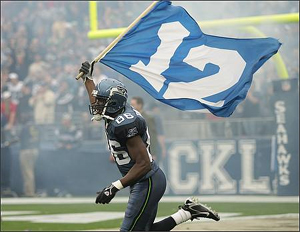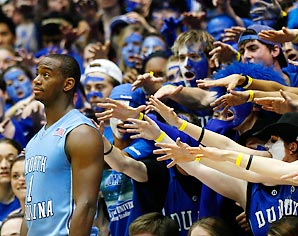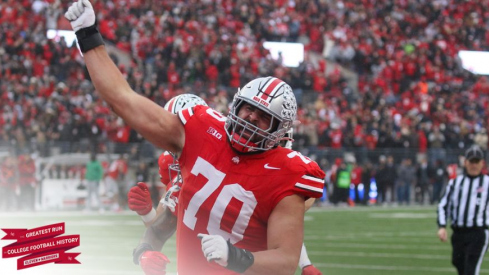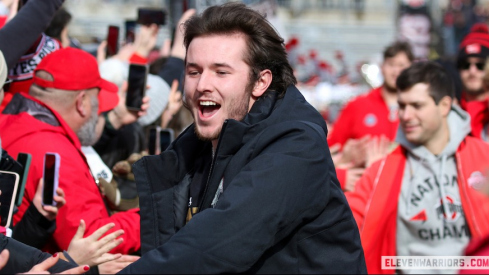 Gerald McCoy pumps up the crowd.
Gerald McCoy pumps up the crowd.In Grantland’s article, “What Do You Mean, ‘We?’” Chris Jones explores the phenomenon of sports fans using the personal pronoun “we” in reference to their team of choice. With very few (and rather obscure) exceptions, Jones asserts that only those who play or work for a team should be using “we” when referring to the team.
Admittedly, I’ve fallen into this trap myself many times before. After all, aside from my family, not a single relationship (of any kind) that I have had in my life has lasted as long as the one I have with my sports teams. How many things do you still love as much as you did when you were a little child?
This isn’t to say that I actually believe that I am on the team or that anyone who is would consider me to be a part of their “we.” I’m not completely delusional. But, if nothing else, the bond is certainly greater than that which I have had with many others along the way.
Maybe there is a “we” that is applicable beyond the players and the staff. Maybe those of us who have gone to great lengths to attend a game, experienced our first heartbreak at a sporting event, or sacrificed our voices, because we believe that being loud on defense does make a difference, make up a different “we” than the one Jones assumes diehard fans speak of. A bigger “we.” A more inclusive “we.” A community created by an incredibly irrational, yet amazing, bond with people, both on and off the field, that we share something with.
I can’t help but answer Jones’ question with questions of my own. The most pressing one being, who does he think he is? How does anyone have the right to tell a truly loyal fan the boundaries within which they can define their relationship with a team? Does he honestly expect fans to refer to the team they’ve invested time, money and their souls into the same way they would their most hated rival? “They” sounds so far removed from something that we as fans so closely associate with. “They” sounds so much like... Michigan.
Jones opens his argument by claiming that teams don’t need fans. His evidence of this is the Florida Marlins and their continuing existence, despite the lack of fan support. I have to argue that eventually, without fans, the Marlins would cease to exist. Of course, any team can stand to lose a handful of fans, except for possibly the Miami Hurricanes. No team, however, is sustainable in a world without the concept of fans altogether. Even an independently wealthy team owner who could continue to foot the bill for a fanless franchise until the end of time would find no joy in empty stands, zero TV ratings, a lack of jersey sales and the vacancy of excitement around the team that only true fans can create.
In fact, without the type of fans that care enough to say, “we,” the world of modern sports as we know it would not exist. There would be no need for the games, 24 hour sports programming or even websites much like the one that give Chris Jones a forum for his thoughts on sports. If sports were merely about what happens on the field, then there would be no need for coverage and analysis beyond the field. Without the “we” fans, the 24/7 craving for any and all things sports simply vanishes, and so do the entities it supports.
 The Seahawks acknowledge the contributions of their fans.
The Seahawks acknowledge the contributions of their fans.Let’s say for a minute, however, that sports teams really don’t require fans at all. Is this really the measuring stick we use in life to determine whether one has the right to use a personal pronoun? No family needs or requires a newborn baby. In fact, one could argue that no single member of a family is truly necessary in order for the family to exist, but every family member is still a part of the family. No one would argue that individual family members have no right to the use of “we” when discussing the family. Regardless of their tangible contribution, family is family.
Jones continues his point by saying that this usage of “we” would simply be absurd when applied to other forms of entertainment, such as music. He claims that the “closest analogy to a sports team is to a band you might love.” Personally, I think it’s absurd that he would even begin to go there.
Music is incredible, it’s a universal language that does, in its own way, create a sense of community that allows people to bond over a common interest, much like sports. But the relationship one has with a band can in no way compare to that of a sports team. If this analogy was even close to valid, MTV would still be about music. Music fans wouldn't have multiple favorite bands, in the same way true sports fans can not have multiple favorite teams of the same sport.
Sure, you can invest your personal resources to follow a band and prove your support for them, but when is the last time any Ohio State fan left a concert feeling the same high he or she felt after the 2003 Fiesta Bowl? Or feeling the same low they felt after the 2009 USC game? Bands and concerts are great; however, they are no sports teams and sporting events. Anyone who would claim the similarities are striking enough to draw that analogy, probably never has been a “we” kind of fan anyway.
Jones rests his case on the point that “we” is reserved for participants, not observers… and fans are merely observers. Would Jones tell fans at an LSU night game, members of “The Black Hole,” or the Cameron Crazies that what they are doing is merely “observing”? The home field advantage of Autzen Stadium would never be a point of debate if the Ducks fans there did nothing beyond observe the game. The Seattle Seahawks would have never presented a game ball to the 12th Man after an OT win over the Giants in 2005 if they didn’t feel the crowd’s noise didn’t contribute to eleven false starts and three missed field goals by the opponent. White Outs and Paternoville would have never come into existence if these things had zero impact. Defensive players would never raise their arms in an attempt to get the crowd going if they didn’t feel the difference.
Furthermore, there are instances in sports where fans truly do become more than just an audible witness to the game. Would Jones argue that Steve Bartman has legitimized his right to the word, “we” when discussing the Cubs because he has touched a ball in play? Would Bartman’s right to “we” also extend to the Marlins, seeing as how he “participated” along with them in that game as well?
 The Cameron Crazies distract rival UNC.
The Cameron Crazies distract rival UNC.By Jones’ logic, a split second decision (or lack thereof) by Bartman not only shifted the proper word choice for him from “they” to “we,” but did so for two teams in the same moment. By Jones’ logic, Bartman has more right to “we” than the entire Block O section of the Horseshoe. More right to “we” than the 12th Man at Texas A&M.
Granted, he allows an exception for any student whose fees help fund the team… but what if they don’t? Then those students aren’t a part of “we”? Assuming tuition money made its way over to the athletic department, then ticket and jersey sale dollars mean less than those tuition dollars? What Jones doesn’t really get is that the “we” in sports goes deeper than something a forensic accountant could decipher. Pardon the fan girl moment here, but it’s much more special than that. It isn't so black and white.
My conclusion? Only you can define your relationship with your team. If when you say “we” it’s because you honestly think you were down on the field that day, then I suggest you seek help. If you honestly think the team would cease to exist once you are gone, all I can do is tell you that you’re wrong.
But, if you’re the type of fan that has poured your heart and soul into this passion of yours, the type of fan that doesn’t switch to “they lost” when things are rough, and distributes the “we” evenly among the good and the bad... then say "we" all you want. It's your right.
Who is Chris Jones to tell you that the moment a kid from Pennsylvania announces he will be attending “The University of Ohio State” he becomes more “we” than you? If the rules of sports fandom could be dictated, we wouldn’t be living in the modern sports world Jones speaks of. It wouldn't be as special, and it's rather sad that Jones fails to see this, as I imagine he is, in some way, a sports fan. For Jones' sake, however, I hope he has fun playing 12th Man at his next concert of choice.

